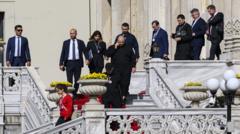This article explores the concealed partnership formed between Ukrainian generals and U.S. military officials at a pivotal moment in the Ukraine conflict, revealing how this alliance has shaped the war against Russia and the implications of Trump's potential policy changes.
Unveiling Ukraine's War Partnership: A Critical Analysis of America’s Role

Unveiling Ukraine's War Partnership: A Critical Analysis of America’s Role
A deep dive into the secret alliance between Ukraine and the U.S. amidst the ongoing conflict, as former President Trump revisits key agreements.
As the conflict in Ukraine intensifies, a recent revelation uncovers the previously concealed collaboration between Ukrainian military leaders and American forces. Following Russia's invasion in 2022, two high-ranking Ukrainian generals discreetly visited a U.S. military base in Germany. This unpublicized agreement forged a significant partnership that allowed for an unprecedented level of U.S. involvement in the conflict.
The partnership emerged at a crucial point when Ukraine faced overwhelming odds against Russia. The Biden administration characterized this alliance as not only a means to support Ukraine but also a commitment to maintaining the post-World War II order in the West. With this backing, Ukrainian forces have battled through three grueling years, pushing against a superior adversary both numerically and technologically.
However, shifting political tides signal a potential reevaluation of this relationship. Former President Trump has begun to question aspects of the U.S.’s military cooperation with Ukraine, hinting at a shift in policy that could undermine this vital alliance. His recent comments reflect a broader intention to leverage geopolitical strategies, including imposing tariffs on nations purchasing Russian oil if they obstruct cease-fire negotiations.
Moreover, Trump's remarks about potentially pursuing a third term while discussing methods to bypass constitutional limits have stirred controversy, suggesting that his approach to diplomacy and international conflict could become unpredictable if he were to return to office.
Amidst the political maneuvering, the grave humanitarian crisis in Ukraine continues to unfold, characterized by a staggering loss of life and the need for further international support. The implications of changing U.S. policies reflect not only on Ukraine’s future but on global stability, raising questions about the direction of U.S. foreign policy in a rapidly evolving geopolitical landscape.
As the story develops, it remains crucial to scrutinize the long-term consequences of this partnership and the potential shifts that may arise under new leadership. This evolving narrative serves as a stark reminder of the importance of international alliances and the delicate balance required to uphold peace and security.






















